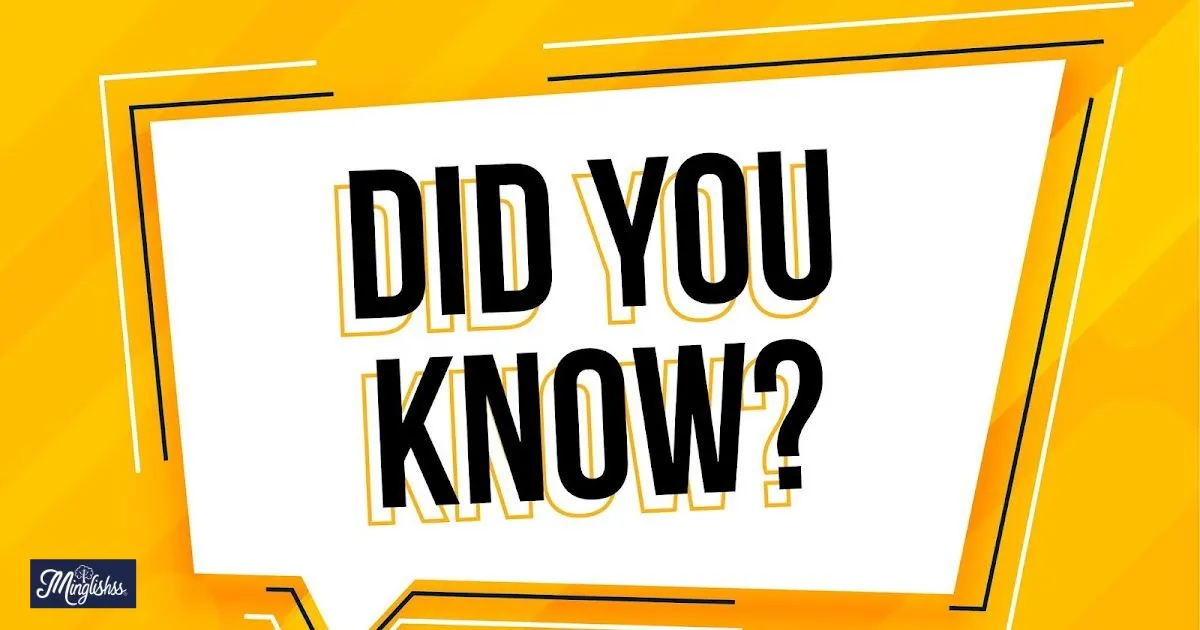“Curiosity sparks conversations and opens doors to knowledge!”
The phrase “Did you know?” is a popular way to introduce interesting facts or information. It’s a great way to engage others and spark curiosity. However, sometimes it can be refreshing to switch up our language.
By using different phrases, we can keep our conversations lively and encourage others to share their thoughts and ideas.
Exploring alternative expressions not only enriches our vocabulary but also helps us connect with our audience more effectively. This is especially useful in conversations, presentations, or social media posts where you want to capture attention and create a sense of wonder.
Next time you want to share something intriguing, consider one of these 35 alternatives to “Did you know?” to elevate your communication!
1. “Have you heard?”
Scenario: While chatting with friends, you say, “Have you heard about the new café in town?”
Subject Explanation: This phrase invites curiosity and prompts discussion.
Additional Tip: Use it to introduce trending topics or news.
2. “You might be surprised to learn…”
Scenario: When discussing climate change, you say, “You might be surprised to learn that it affects global weather patterns.”
Subject Explanation: This expression piques interest and encourages further inquiry.
Additional Tip: Use it for sharing unexpected facts.
3. “Did you realize?”
Scenario: In a meeting, you ask, “Did you realize that our team increased sales by 20% last quarter?”
Subject Explanation: This phrase emphasizes awareness of a significant fact.
Additional Tip: Perfect for highlighting achievements or milestones.
4. “Have you ever considered?”
Scenario: When talking about healthy eating, you say, “Have you ever considered the benefits of meal prepping?”
Subject Explanation: This invites others to think critically about a topic.
Additional Tip: Great for engaging discussions on lifestyle changes.
5. “Here’s an interesting fact…”
Scenario: While giving a presentation, you say, “Here’s an interesting fact: honey never spoils!”
Subject Explanation: This phrase introduces information in an engaging way.
Additional Tip: Use it to capture your audience’s attention.
6. “What if I told you…”
Scenario: In a casual conversation, you say, “What if I told you that octopuses have three hearts?”
Subject Explanation: This sparks curiosity and invites speculation.
Additional Tip: Use it to share quirky or surprising facts.
7. “Let me share something with you…”
Scenario: When sharing a recent discovery, you say, “Let me share something with you: the Eiffel Tower can be 15 cm taller in the summer.”
Subject Explanation: This phrase establishes a personal connection while sharing knowledge.
Additional Tip: Ideal for storytelling or personal anecdotes.
8. “You may not know…”
Scenario: When discussing history, you say, “You may not know that Cleopatra lived closer to the moon landing than to the building of the Great Pyramid.”
Subject Explanation: This phrase indicates that the information might be unfamiliar to the audience.
Additional Tip: Use it to introduce lesser-known historical facts.
9. “Here’s something to think about…”
Scenario: When discussing the importance of sleep, you say, “Here’s something to think about: lack of sleep can affect your memory.”
Subject Explanation: This encourages reflection on the topic at hand.
Additional Tip: Use it to introduce thought-provoking concepts.
10. “Did you ever wonder?”

Scenario: In a discussion about space, you ask, “Did you ever wonder how many stars there are in the universe?”
Subject Explanation: This phrase invites curiosity and imaginative thinking.
Additional Tip: Ideal for discussions about science and exploration.
11. “I found out that…”
Scenario: While talking to a friend, you say, “I found out that bananas are berries!”
Subject Explanation: This phrase personalizes the information and adds an element of discovery.
Additional Tip: Use it to share fun and unexpected knowledge.
12. “Did you catch that?”
Scenario: When reviewing a documentary, you ask, “Did you catch that they filmed it in 12 countries?”
Subject Explanation: This engages others by prompting them to recall a specific detail.
Additional Tip: Great for discussions about media or events.
13. “Have you ever come across…”
Scenario: While discussing literature, you say, “Have you ever come across the idea that Shakespeare invented over 1,700 words?”
Subject Explanation: This phrase invites exploration of interesting concepts.
Additional Tip: Use it to introduce literary facts or theories.
14. “Here’s a little-known fact…”
Scenario: In a trivia game, you say, “Here’s a little-known fact: the shortest war in history lasted just 38 minutes.”
Subject Explanation: This expression adds an element of surprise to the information shared.
Additional Tip: Perfect for trivia or casual conversations.
“Other Ways to Say “Happy Thursday”
15. “You might not believe this, but…”
Scenario: When sharing surprising statistics, you say, “You might not believe this, but more people have cell phones than toilets!”
Subject Explanation: This phrase adds a layer of intrigue and disbelief.
Additional Tip: Use it for shocking or surprising information.
16. “Here’s something you might find fascinating…”
Scenario: When discussing marine life, you say, “Here’s something you might find fascinating: dolphins have unique whistles.”
Subject Explanation: This invites interest and further exploration of the topic.
Additional Tip: Ideal for discussions on nature or science.
17. “Did you ever hear the story about…”
Scenario: When sharing folklore, you say, “Did you ever hear the story about how the Great Wall of China was built?”
Subject Explanation: This invites curiosity about historical narratives.
Additional Tip: Use it for storytelling or cultural discussions.
18. “Let me tell you something interesting…”
Scenario: When discussing technology, you say, “Let me tell you something interesting: the first computer was the size of a room!”
Subject Explanation: This phrase establishes a personal connection while sharing knowledge.
Additional Tip: Great for sharing technological advancements.
19. “What’s even more fascinating is…”
Scenario: When discussing wildlife, you say, “What’s even more fascinating is that flamingos are naturally gray!”
Subject Explanation: This emphasizes an intriguing aspect of a topic.
Additional Tip: Use it to highlight surprising details.
20. “Did you know that…”
Scenario: In a casual conversation, you say, “Did you know that honeybees communicate through dances?”
Subject Explanation: This phrase is a direct way to share intriguing information.
Additional Tip: It’s a classic introduction to fascinating facts.
21. “I bet you didn’t know…”
Scenario: When discussing unusual hobbies, you say, “I bet you didn’t know that competitive dog grooming is a real sport!”
Subject Explanation: This phrase adds an element of challenge and curiosity.
Additional Tip: Use it to share surprising or niche information.
22. “You should check out…”

Scenario: When recommending a book, you say, “You should check out this book about the mysteries of the ocean!”
Subject Explanation: This phrase encourages exploration and learning.
Additional Tip: Ideal for sharing recommendations.
23. “What’s interesting is…”
Scenario: When discussing architecture, you say, “What’s interesting is that the Leaning Tower of Pisa leans because of unstable foundation.”
Subject Explanation: This highlights an intriguing aspect of a topic.
Additional Tip: Use it to prompt deeper conversation.
24. “Let me share a secret with you…”
Scenario: When revealing a fun fact, you say, “Let me share a secret with you: sea otters hold hands while they sleep!”
Subject Explanation: This adds a playful tone while sharing information.
Additional Tip: Great for sharing lighthearted or cute facts.
25. “Have you ever thought about…”
Scenario: When discussing historical events, you say, “Have you ever thought about how the first Olympic Games were held in 776 BC?”
Subject Explanation: This phrase encourages reflection on the past.
Additional Tip: Use it to engage others in historical discussions.
26. “What’s more interesting is…”
Scenario: When discussing space, you say, “What’s more interesting is that there’s a planet made of diamonds!”
Subject Explanation: This emphasizes intriguing aspects of a subject.
Additional Tip: Ideal for discussions about science and astronomy.
27. “Let’s talk about something cool…”
Scenario: When discussing innovations, you say, “Let’s talk about something cool: 3D printing is revolutionizing medicine!”
Subject Explanation: This phrase invites excitement about current advancements.
Additional Tip: Use it for discussions on technology.
28. “I’ve come across something neat…”
Scenario: When discussing travel, you say, “I’ve come across something neat: there’s a hotel made entirely of ice!”
Subject Explanation: This adds a personal touch to the information shared.
Additional Tip: Ideal for sharing travel-related facts.
29. “Here’s something you probably didn’t know…”
Scenario: When discussing geography, you say, “Here’s something you probably didn’t know: Canada has more lakes than the rest of the world combined!”
Subject Explanation: This phrase invites curiosity about the information shared.
Additional Tip: Use it to introduce geographical facts.
30. “You’ll never guess that…”
Scenario: When sharing a quirky fact, you say, “You’ll never guess that wombat poop is cube-shaped!”
Subject Explanation: This adds an element of surprise to the conversation.
Additional Tip: Use it for funny or bizarre facts.
31. “Check this out…”
Scenario: When sharing a cool invention, you say, “Check this out: there’s a machine that turns plastic waste into usable fuel!”
Subject Explanation: This invites others to engage with the topic.
Additional Tip: Use it for sharing innovations or discoveries.
32. “I learned something amazing…”
Scenario: While chatting with friends, you say, “I learned something amazing: a group of flamingos is called a ‘flamboyance’!”
Subject Explanation: This personalizes the sharing of interesting information.
Additional Tip: Great for fun and engaging conversations.
33. “What’s really intriguing is…”
Scenario: When discussing ancient civilizations, you say, “What’s really intriguing is that the pyramids were built with incredible precision!”
Subject Explanation: This highlights captivating aspects of a subject.
Additional Tip: Use it to deepen discussions on history.
34. “Did you know that you can…”
Scenario: When discussing hobbies, you say, “Did you know that you can train your brain to improve memory?”
Subject Explanation: This invites others to explore self-improvement.
Additional Tip: Ideal for discussions on personal development.
35. “You’re going to want to hear this…”
Scenario: When sharing exciting news, you say, “You’re going to want to hear this: there’s a new study showing the benefits of gratitude!”
Subject Explanation: This builds anticipation for the information shared.
Additional Tip: Use it for exciting or impactful news.
Pros and Cons of Using Alternative Expressions
Pros:
- Engagement: Different expressions capture attention and stimulate interest.
- Personal Style: Helps convey your unique voice in conversations.
- Variety: Enhances communication by avoiding repetition.
Cons:
- Cultural Sensitivity: Some phrases may not translate well across cultures.
- Misinterpretation: Certain expressions might be misunderstood.
- Overuse: Using too many alternatives can sound forced or insincere.
Conclusion
Exploring various ways to say “Did you know?” enriches your communication and makes sharing information more engaging. The 35 alternatives provided cater to different contexts, allowing you to connect with your audience authentically.
Next time you want to share something interesting, consider using one of these alternatives to keep the conversation lively and informative!
Feel free to adjust any part of this post to align with your voice!

Hi, I’m Isabel: I’m passionate about turning language learning into a fun adventure. I believe in making every word exciting and memorable.










